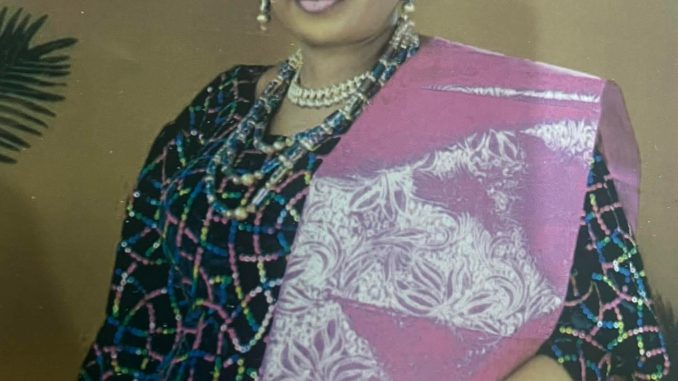
By Babafemi Ojudu
Last Friday, we buried Kenny — an
ally, a politician, and a woman of rare courage.
Kehinde Adebowale Ajifolawe , nee Olokesusi, fondly called Kenny Ise, was a trader in Fayose Market, Ado-Ekiti. Years ago, she left for America, started a family, and somehow found herself in a situation . Life brought her back to Nigeria — separated from her husband and children, but never separated from her principles.
She was loyal, open-minded, and brutally frank. Kenny was not your average politician. If she stood with you, she stood all the way. No hypocrisy, no double-speak. She spoke truth to power — and as we say, “she no send.”
I saw this side of her clearly in 2018 when she led the women’s wing of my campaign for the governorship ticket in Ekiti. She worked tirelessly, rallied everyone, and gave her best.
The last time I saw Kenny was in June, at my wife’s 60th birthday celebration. She was her usual lively self — laughing, dancing, teasing, and correcting. She filled every room she entered with energy. That was Kenny: full of light.
A Funeral Turned Fundraiser
Then came her funeral.
There she was, lying still in her coffin — a woman in her fifties, gone too soon, her husband and children far away. The atmosphere was heavy with grief. But before long, the officiating reverend of the Anglican Church turned sorrow into spectacle.
We were called four separate times to make donations during the service. We were asked to put another in envelopes. That could have been overlooked. But then came the shocking moment.
Kenny’s two nieces — barely out of their teens — were called forward to represent her children. They nervously announced a donation of ₦200,000 to the church. Instead of showing gratitude, the reverend frowned and said it was “too small.”
I was horrified. The young girls froze in shame. I had to get up, take the microphone, and add to the donation — just to save them from further embarrassment.
But it didn’t end there. The reverend then asked every mourner to come forward, one after another, to announce their donations publicly.
That was when the crowd erupted.
“Why are you doing this?”
“What are you selling here?”
“Are we here to mourn or to buy?”
Voices rose in anger. The congregation rose up in unison and began to walk out. Women shouted that the church had already collected ₦100,000 “for diesel,” plus several other charges just to hold a one-hour service.
The reverend’s face went pale with embarrassment. The moment was chaotic, painful — and deeply revealing.
When Compassion Took Flight
That day, I felt profound sorrow — not just for Kenny, but for the state of the church in Nigeria.
What was once a refuge for the broken has become a marketplace. Compassion has taken flight.
Funerals and weddings are now opportunities for fundraising. The pulpit has become a counter. The sacred has been replaced by salesmanship.
The missionaries who brought Christianity here did not behave like this. They mourned with the grieving, cared for the widows, took in orphans, and offered free education. They gave without expecting payment.
But their successors — our own clergy — have turned faith into business. The altar into a cash point. The gospel into a commodity.
A Call for Reform
What happened in Ise-Ekiti must not be dismissed as an isolated incident. It is a symptom of a deeper moral sickness — one that is eroding the soul of the church.
When mourners revolt inside a church, it is not rebellion. It is a cry of conscience.
If the church in Nigeria does not rediscover compassion, humility, and service, it risks losing its moral authority completely. People will simply stop showing up — not because they’ve lost faith in God, but because they’ve lost faith in those who claim to speak for Him.
Christianity was never meant to be a bazaar. It was meant to be a refuge.
It’s time the church returns to that calling.
By Babafemi Ojudu
Journalist • Former Senator • Former Presdential Advisor • Public Policy Advocate






Be the first to comment